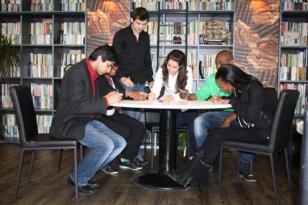Sustainable Business Seminar
 In October 2011 I had the privilege of conducting a seminar at WUAS on sustainable business. I presented a number of models that have inspired companies to take sustainability on board. One of them showed how corporate values eventually lead to sustainable strategies informed by the company’s stakeholders and own risk analyses. At a later moment during the seminar I asked the students to split up in small groups and work on a sustainability strategy for an imaginable company. They were encouraged to use the previous model and information from the UN’s Global Compact (which is a strategic policy initiative for businesses that are committed to aligning their operations and strategies with ten universally accepted principles in the areas of human rights, labour, environment and anti-corruption).
In October 2011 I had the privilege of conducting a seminar at WUAS on sustainable business. I presented a number of models that have inspired companies to take sustainability on board. One of them showed how corporate values eventually lead to sustainable strategies informed by the company’s stakeholders and own risk analyses. At a later moment during the seminar I asked the students to split up in small groups and work on a sustainability strategy for an imaginable company. They were encouraged to use the previous model and information from the UN’s Global Compact (which is a strategic policy initiative for businesses that are committed to aligning their operations and strategies with ten universally accepted principles in the areas of human rights, labour, environment and anti-corruption).
After some time of preparation, students from the various groups presented the results of their group deliberations. It was intriguing to hear what suggestions they brought to the fore. Criticism on details would not have been difficult to utter, but the most important thing was that the students were engaged in thinking about how sustainability can be integrated in a company’s strategies. Because, that is exactly what they have to do when after graduation they start working in companies.
Wittenborg Business School's decision to take sustainability on board as a major theme is a laudable step. There are still sceptics who think they can stick to ‘business as usual’, but I consider myself fortunate to see that more and more industrial leaders acknowledge the relevance of sustainability. For instance, ‘Trouw’ (26 October 2011) reported an interview with Paul Polman, the CEO of Unilever. He made some notable statements. I just mention a few of them:
• Companies have to deal with the world’s challenges: hunger, water shortage, climate change, lack of food; and all these problems relate to each other.
• Many companies are satisfied with complying with the law; other deal with philanthropy. I do not criticize these actions, but they do not have led to the solution. Now is the moment to adapt our business model. For us, we do not ask ourselves anymore how we can use society to be successful, but instead we ask ourselves how we can contribute to society to be successful.
For me, these statements underline that the seminar on sustainable business and other educational activities which Wittenborg has in reserve are timely and to the point. By the way, no student who attended the workshop questioned that. For them, it was already clear. It was about their own future.
Dr Teun Wolters
16/11/11